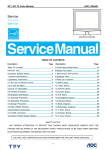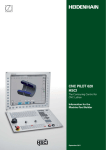Download AOC L15X421, L20S421, L20W421 Flat Panel Television User Manual
Transcript
User's Manual LCD TV L15X421 L20S421 L20W421 Q41T2001673 3A USER’S MANUAL TABLE OF CONTENTS IMPORTANT SAFETY INSTRUCTIONS ------------------------------------- 2 PREPARATION ---------------------------------------------------------------------4 MOUNTING THE TV BASE································································ 5 OPERATING INSTRUCTIONS -------------------------------------------------7 Use of the remote control --------------------------------------------------7 To use the menus ------------------------------------------------------------8 Main menu ---------------------------------------------------------------------8 CONNECT PERIPHERAL EQUIPMENT -------------------------------------16 Front Panel Control Knobs -------------------------------------------------16 Preparation --------------------------------------------------------------------17 Video recorder ----------------------------------------------------------------18 DVD player ---------------------------------------------------------------------19 Camera, camcorder, Video Game set -----------------------------------19 Headphone --------------------------------------------------------------------20 Tips ------------------------------------------------------------------------------21 PRODUCT SPECIFICATION ---------------------------------------------------22 BEFORE CALLING SERVICE --------------------------------------------------24 0 Glossary ------------------------------------------------------------------------25 Thank you very much for choosing the LCD TV. We recommend that you take a few minutes to read carefully through this manual before installing and switching on the TV. Please keep this manual in a safe place for your future reference. SAFETY: Lamp Disposal LAMP(S) INSIDE THIS PRODUCT CONTAIN MERCURY AND MUST BE RECYCLED OR DISPOSED OF ACCORDING TO LOCAL, STATE OR FEDERAL LAWS. FOR MORE INFORMATION, CONTACT THE ELECTRONIC INDUSTRIES ALLIANCE AT WWW.EIAE.ORG. SYMBOL SA 1965 SA 1966 SYMBOL DEFINITION DANGEROUS VOLTAGE: The lightning flash with arrowhead symbol, within an equilateral triangle,is intended to alert the user to the presence of insinuated “dangerous voltage” within the product’s enclosure that may be of sufficient magnitude to constitute a risk of electrical shock to persons. INSTRUCTIONS: The exclamation point within an equilateral triangle is to alert the User to the presence of important operating and maintenance (servicing) instruction in the literature accompanying the appliance. Apparatus shall not be exposed to dripping or splashing and no objects filled with liquids, Such as vases, Shall be placed on the apparatus. Caution - Danger of explosion if battery is incorrectly replaced. Replace only with the same or equivalent type. 1 IMPORTANT SAFETY INSTRUCTIONS Read before operating equipment 1. 2. 3. 4. 5. 6. 7. Read these instructions. Keep these instructions. Heed all warnings. Follow all instructions. Do not use this apparatus near water. Clean only with a dry cloth. Do not block any of the ventilation openings. Install in accordance with the manufacturers instructions. 8. Do not install near any heat sources such as radiators, heat registers, stoves, or other apparatus (including amplifiers) that produce heat. 9. Do not defeat the safety purpose of the polarized or grounding type plug. A polarized plug has two blades with one wider than the other. A grounding type plug has two blades and third grounding prong. The wide blade or third prong is provided for your safety. When the provided plug does not fit into your outlet, consult an electrician for replacement of the obsolete outlet. 10. Protect the power cord from being walked on or pinched particularly at plugs, convenience receptacles, and the point where they exit from the apparatus. 11. Only use attachments/accessories specified by the manufacturer. 12. Use only with a cart, stand, tripod, bracket, or table specified by the manufacturer, or sold with the apparatus. When a cart is used, use caution when moving the cart/apparatus combination to avoid injury from tip-over. 2 13. The TV should be operated only from the type of power source indicated on the label. If you are not sure of the type of power supplied to your home, consult your dealer or local power company. 14. Unplug this apparatus during lightning storms or when unused for long periods of time. 15. Refer all servicing to qualified service personnel. Servicing is required when the apparatus has been damaged in any way, such as powersupply cord or plug is damaged, liquid has been spilled or objects have fallen into apparatus, the apparatus has been exposed to rain or moisture, does not operate normally, or has been dropped. 16. This product may contain lead or mercury. Disposal of these materials may be regulated due to environmental considerations. For disposal or recycling information, please contact your local authorities or the Electronic Industries Alliance: www.eiae.org 17. Damage Requiring Service – The appliance should be serviced by qualified service personnel when: A. The power supply cord or the plug has been damaged; or B. Objects have fallen, or liquid has been spilled into the appliance; or C. The appliance has been exposed to rain; or D. The appliance does not appear to operate normally or exhibits a marked change in performance; or E. The appliance has been dropped, or the enclosure damaged. 18. Tilt/Stability – All televisions must comply with recommended international global safety standards for tilt and stability properties of its cabinets design. Do not compromise these design standards by applying excessive pull force to the front, or top, of the cabinet, which could ultimately overturn the product. Also, do not endanger yourself, or children, by placing electronic equipment/toys on the top of the cabinet. Such items could unsuspectingly fall from the top of the set and cause product damage and/or personal injury. 19. Wall or Ceiling Mounting – The appliance should be mounted to a wall or ceiling only as recommended by the manufacturer. 20. Power Lines – An outdoor antenna should be located away from power lines. 21. Outdoor Antenna Grounding – If an outside antenna is connected to the receiver, be sure the antenna system is grounded so as to provide some protection against voltage surges and built up static charges. Section 810 of the National Electric Cord, ANSI/NFPA No. 70-1984, provides information with respect to proper grounding of the mats and supporting structure grounding of the lead-in wire to an antennadischarge unit, size of grounding connectors, location of antennadischarge unit, connection to grounding electrodes and requirements for the grounding electrode. See Figure below. 3 EXAMPLE OF ANTENNA GROUNDING AS PER NATIONAL ELECTRICAL CODE Note to the CATV system installer: This reminder is provided to call the CATV system installer’s attention to Article 820-40 of the NEC that provides guidelines for proper grounding and, in particular, specifies that the cable ground shall be connected to the grounding system of the building, as close to the point of cable entry as practical. Please, make sure to connect the power plug to the wall outlet socket after connecting the TV to the adapter! 22. Objects and Liquid Entry – Care should be taken so that objects do not fall and liquids are not spilled into the enclosure through openings. 4 PREPARATION 1. Place the TV on a solid surface. Ensure that the TV is placed in a position to allow free flow of air. Do not cover the ventilation openings on the back cover. To prevent any unsafe situations, no naked flame sources, such as lighted candles, should be placed on or in the vicinity. Avoid heat, direct sunlight and exposure to rain or water. The equipment shall not be exposed to dripping or splashing. 2. Insert the aerial plug firmly into the aerial socket at the back of the TV. Note: L20S421 has the handle at the back of the TV. 5 MOUNTING THE TV BASE The TV base will be separated with the TV unit. You should Install the base before you use the TV unit. Place the TV on its face on a soft blanket. Install the base stand with three screws. Place the TV on the table. Note: L15X421 does not need the screws to install. 6 3. Remote control: Remove the cover of the battery compartment. Insert the 2 batteries supplied (Type AAA 1.5V). 4. Power: Insert the power cord in the wall socket having an AC power supply. 5. Turn the TV on: Turn the main power switch on the right side of TV to ON. Press the secondary power button in front of the TV to turn it on. When the TV is ON, the LED may be green or Red When LED is green, the TV is working; when LED is Red, the TV is in idle mode for energy saving or Power Off. When pull out AC Power Cable or AC Power Switch Off, LED is Off. OPERATING INSTRUCTIONS 7 USE OF THE REMOTE CONTROL MUTE POWER Temporarily interrupt the sound or restore it. Press to turn on/off the TV. The TV is never completely powered off unless it is physically unplugged. DISPLAY Press this button to Display Channel number on the right-top corner. 0~9/100 Digit buttons To select a TV channel. CH Press or ( or ) to browse through the TV channels,which are not erased. To view a blocked channel, use the digital buttons to access,the channel and enter your access code. MTS /SAP Press this key to activate Multichannel Television Sound, Stereo or Mono sound. PRE-CH To display the previously selected TV channel. VOL TV/VIDEO Press + or – to adjust the volume. Select your input source: press repeatedly to select TV, AV, S-VIDEO, PC. PC Press this button to turn PC mode CAPTION SLEEP With this key you can set a time period after which the TV should switch itself to standby. Press the key repeatedly to select the number of minutes. The counter runs from 5,10,15,20,25…120 minutes. PIP Not Supported. POP Not Supported. MENU Press repeatedly to display OSD menu. V-CHIP Press this button to setup parental control. SWAP Not Supported. SIZE Press this button to turn Auto,Normal, Expand, Compress, Amaronap. 8 Press this button to turn Closed Caption on. Be sure you have selected Caption On in the Setup menu. Up & Down Press Up and Down we Can select the submenu Left & Right Press Left and Right ,we can Change the Setting of submenu TO USE THE MENUS 1. 2. 3. 4. Press the MENU button to display or close main menu. Use the cursor up/down to select a menu item. Use the cursor left/right to enter a submenu or enable/disable the function. Press the MENU button to exit the menu. MAIN MENU Press the MENU button to enter the main OSD (On Screen Display). Adjust the items including Picture Setup, Sound setup, Child Lock Setup, Function Setup and TV setup. When the input source is PC or Component mode, only the Sound Setup, Picture Setup and Menu Setup can be selected; shown in the figure below: When the input source is AV or S-Video mode, the Sound Setup, Picture Setup, Child Lock Setup and Function Setup can be selected; shown in the figure below: 9 When the input source is TV mode, the Sound Setup, Picture Setup, Child Lock Setup, Function Setup and TV Setup can be selected; shown in the figure below: Sound Setup (Same as in PC, TV, AV1, S-Video and Components modes) 1. The range of adjusting volume, bass and treble is from 0~100. 2. Select “ON” or “OFF” in sound selection to control the sound output. 3. The range of adjusting Balance is -50~+50; when adjusting from 0 to -50, the sound from the left track fades until silence; when adjusting from 0 to +50, the sound from the right track fades until silence. 4. AVL: you can set it “ON” or “OFF”. The function is to adjust the input sound automatically. You may enable this function when you notice that the sound in the two tracks are very different, in order to prevent the bad sound effect resulting from large sound variation. 5. Select "ON" or "OFF" for Loudness: a default setting is preset, you may adjust when necessary. The following menu will appear when selecting continuously: 6. 7. 8. Preset: Designed for different types of sound output, wherein, the dialogue, music and theater modes are preset; you can set Bass, Treble and Equalizer in sound output mode according to your preference. Equalizer: You can select and adjust 100, 300, 1K, 3K and 8K respectively (the figures represent the sound frequency range). Reset to default: Reset the sound setting to the factory default value. 10 Picture Setting When the input source is in PC mode, you can select Brightness, Contrast, Position, Video noise, Sharpness, Auto Adjust, Info, Colour Temp., Red, Green, Blue and Reset to default; shown in the figure below: 1. 2. 3. 4. 5. 6. 7. 8. Brightness and Contrast: The range can be adjusted from 0~100. Position: There are two options, Horizontal and Vertical, which can be adjusted from -50 to +50. Video noise: There are two options, Phase and Clock, which can be adjusted from -50 to +50. Sharpness: Select from five options of Softest, Soft, Auto, Sharp and Sharpest. You may adjust the above options according to your preference. Auto Adjust: Automatically adjust PC input to the optimal screen size. Info: Prompt the current size for PC input definition (only the definition that can be shown by this device). Colour Temp.: There are four options of colour temperature provided for users - 6500, 7300, 9300 and Personal. You can select the three colour temperatures of 6500, 7300 and 9300, or manually adjust red, green or blue in the personal setting (you can only adjust red, green and blue in the personal setting). Reset to default: It is used to reset the picture settings to the factory default mode. 11 When the input source is in TV/AV1/S-Video/ mode, you can select Brightness, Contrast, Colour, Sharpness, Tint, Dyn. skin tone, Colour Temp., Public, Zoom and Reset to default respectively; shown in the figure below: When the input source is in Component mode, you can select Brightness, Contrast, Colour, Sharpness, Tint, White tone, Size and Reset to default respectively; shown in the figure below: 1. 2. 3. Brightness and Contrast: The range can be adjusted from 0~100; use Brightness and Contrast options to adjust the brightness of picture. Colour: The range can be adjusted from 0~100; use this option to adjust the colour saturation of picture. Sharpness: Select from five options of Softest, Soft, Auto, Sharp and Sharpest. You can adjust the sharpness of picture using any option above. 12 4. 5. 6. 7. 8. Tint: The range can be adjusted from -50~+50; use this option to adjust the colour of picture. Dyn. Skin tone: When the Dynamic skin tone is ON, the skin tone of person in the picture becomes more vivid. Colour Temp.: There are three options of colour temperature provided for users - warm, normal and cold. Size: There are various functions provided for zoom in/zoom out. Reset: It is used to reset the picture settings to the factory default mode. Function Setup When the input source is in TV, AV1 or S-Video mode, you can select Source OSD, Language, Child lock, Timers, CC Mode and Reset to default; shown in the figure below: 1. 2. 3. Current Source OSD setting: When OSD is set to ON, the left upper corner of the display will show the input source or the TV channel number; when OSD is set to OFF, the input source or the TV channel number will disappear. OSD language setting: There are six language options provided English, French, German, Spanish, Portuguese and Traditional Chinese. Child Lock Setup; (1). You can enter the V-Chip level setting only when the Child Lock is ON, and the V-Chip will be enabled; you can not enter V-Chip level setting when the Child Lock Setup is OFF, and the V-Chip is disabled. (2). Lock code: V-Chip password can be set up when the code is locked. Enter the 4-digit password which you choose! The factory default password is 0000. 13 4. 5. 6. Sleep Timer: Set the sleeping timer and the alert function which indicates the time left. Closed Caption (CC) setting: Select CC1~CC4, TXT1~TXT4 or OFF. Reset: It is used to reset the OSD settings. When the input source is in PC or Component mode, you can select Source OSD, Language, Timers and Reset to default; shown in the figure below: Source OSD, Language, Timers and Reset to default options are operated similarly as the above instructions! Child Lock When the input source is in TV, AV1 or S-Video mode, V-Chip level can be set. You can enter the Child Lock setting only when the Child Lock is ON. When you enter the Child Lock setting, a message on the display will prompt you to enter password: 14 You can enter the Child Lock setting to set up the V-Chip level when you enter the correct password: 1. 3. Age: it may be set to Child, Teenager, Youth, Adult, Custom or OFF; when you select Custom, it can be set according to you preference. MPAA Rating: Select the movie ratings from low to high (alert) - G, PG, PG-13, R, NC-17, X and F. PG Rating: Shown in the figure below: 4. The empty box refers to unlocked; the solid box refers to locked. Reset to default: Reset to the factory default value. 2. TV Setting The following menu appears only in the TV mode. 15 1. 2. 3. 4. 5. 6. 7. 8. Channel nr: Shows the current channel number. Tuning mode: Select the mode of TV signal - Cable\HRC Cable\IRC Cable\ Broadcast. System standard: NTSC-M, Auto. Auto search: Select "Auto Search" to search all signaled channel; when the searching is complete, it stays at the first channel with signal and all channels that have been located are stored. If you would like to stop "Auto Search" during the process, simply by pressing the function button. Fine tune: NTSC-M is seldom used. AFC can be set to ON or OFF. When it is set to ON, the TV will search the TV signal automatically; when there is any offset in the signal, it will automatically adjust the channel to the correct position. Skip can be set to ON or OFF. When it is set to ON, a channel can be skipped by pressing the switching button on the remote control or on the front panel. Reset to default: Reset to the factory default value. 16 CONNECT PERIPHERAL EQUIPMENT FRONT PANEL CONTROL KNOBS Power Key? : Press to turn on or off the TV. MENU Key? : Press to show the OSD menu and exit OSD menu at the TV. Down / Up Key? ? : Select the intended function by pressing these two keys, or switch the channels in the TV mode. + /- Key? ? : Press to confirm your function selection and adjustment volume. Source Key? : Press to select your input source. There is a wide range of video and audio equipment that can be connected to your TV. The following connection diagrams show you how to connect them. 17 PREPARATION Remove the back plate at the back of the TV as shown on the illustration opposite. Lay the LCD TV with the screen down on a table, as it will be easier to connect your peripheral equipment. Please take precaution not to damage the screen. 1: VGA audio input 2: VGA input 3: AC power input terminal 4: Headphone outlet 5: AV signal input 6: Left video/audio track input 7: Right video/audio track input 8: S-Video signal input 9, 10 and 11: Pr Pb Y Component signal input 12: Y Pb Pr left audio track input 13: Y Pb Pr right audio track input 14: TV signal input Note: L15X421 have the power switch beside the AC socket on the back cover. VGA: Receive the signals from the host, which is used as the display of the computer. AV: Receive the video/audio signals of the NTSC standards. S-VIDEO(S-VHS): i.e. video Y/C component. Receive the HD Y/C component signal. Y Pb Pr: The modes it supports are HD signals such as 480i, 480p, 720p and 1080i. TV : Receive the TV signals of NTSC-M standard. 18 VIDEO RECORDER How to connect 1. Connect the supplied antenna cable to the RF IN port of your VCR. 2. Connect another FR cable from the port of your VCR to the antenna port of you TV set. If you have connected the video/audio cable to the video AV port, you may have better sound and picture when playing the VCR . If your VCR has an S-VHS video jack: For improved picture quality, connect a S-Video cable with the S-VIDEO input on the TV. S-Video does not provide audio, audio cables must still be connected to provide sound(AV and S terminal share one audio input). Watching VCR 1. 2. 3. If you use connection TV, select the TV channel auto search. If you use connection AV, select video AV input. Insert videotape in the VCR and press the PLAY button. 19 DVD PLAYER How to connect 1. Connect 3 separate components signal cables to the Y, Pb and Pr ports of the component signal of the DVD player, and the Y, Pb and Pr ports of the component signal of theTV set. 2. Connect the audio cable to the audio output port of the DVD player and the audio input port of the component signal of the TV set. How to use 1. Select COMPONENT. 2. Turn on the DVD set. CAMERA CAMCORDER VIDEO GAME SET… How to connect 1. Connect the camera, camcorder and game set to the ports of the audio/video set. 2. The camcorder may get better picture by connecting a S-VHS cable between the S terminal and the Audio set. How to use it 1. Select the video AV or S terminal input. 2. Enable the exterior AV equipment. Warning: In case you notice scrolling images, wrong colors or no color, no picture or even combinations of these, on your screen, check if the connections are done in the right way. Check if the cable colors match with the Input connector colors. 20 DIGITAL SET TOP BOX Connect the top box to the input port of the component signal. How to connect 1. 2. Connect 3 separate component signal cables to the Y, Pb and Pr ports of the component signal of the Digital TV/ Top Box, and the Y, Pb and Pr ports of the component signal of theTV set. Connect the audio cable with the audio port of the Digital TV/Top Box and the audio port of the TV set. How to use 1. 2. Select COMPONENT. Turn on the DVD set-Top box set. Warning: In case you notice scrolling images, wrong colors or no color, no picture or even combinations of these, on your screen, check if the connections are done in the right way. Check if the cable colors match with the Input connector colors. HEADPHONE 1. 2. 3. The headphone jack is located at the rear corner of the TV. The MUTE key on the remote control works on both internal speaker and the headphone. Use volume key to adjust the volume. 21 TIPS Care of the screen Do not rub or strike the screen with anything hard as this may scratch, mar, or damage the screen permanently. Unplug the power socket before cleaning the screen. Dust the TV by wiping the screen and the cabinet with a soft, clean cloth. If the screen requires additional cleaning, use a clean, damp cloth. Do not use liquid cleaners or aerosol cleaners. Mobile telephone warning To avoid disturbances in picture and sound, malfunctioning of your TV or even damage to the TV, keep away your mobile telephone from the TV. End of life directives We are paying a lot of attention to produce environmentally friendly in green focal areas. Your new receiver contains materials which can be recycled and reused. At the end of its life specialized companies can dismantle the discarded receiver to concentrate the reusable materials and to minimize the amount of materials to be disposed of. Please ensure you dispose of your old receiver according to local regulations. 22 Product Specification Function 15" Screen (L15X421) Item LCD Panel Spec Screen Size 15” TFT-LCD Panel Aspect Ratio 4:3 Resolution 1024*768 (XGA) Display Area (opening) 304.128(H) × 228.096(V) HxV Pixel Pitch 0.297mm x 0.297mm Display Clors 16.2 million Lamp Type/Life 60000 hr Color Temperature VGA Function TV Function Video Input Cool / Warm/Normal Input support definition 1024*768 /60Hz Mini jack for stereo headphones Audio input (3.5ø) TV Standard NTSC M Sound System MTS、SAP Colour systems NTSC AV RCA x 1 Audio L/R x 1 S-VIDEO S-Videox 1 Component YPbPr x 1 23 Audio L/R x 1 Speaker (built-in): Two 2 watt speakers Audio output Audio output: L / R OSD Language English. French. German. Spanish. Portuguese. Traditional Chinese Headphone Mini-jack for stereo (3.5ø) Table Stand Yes Wall Mount VESA 100 x 100 mm Power Panel Tilt Power AC100V-240V, 50/60Hz Power Consumption <55W Forwards/Backwards/ Rotation -4°/ +18° / ± 35° Temperature + 0 °C ~ + 40 °C Environment storage operating Dimension W x H x D (with stand) - 25 °C ~ + 60 °C 10% ~ 85% 498 x 495 x 180 (mm) Net weight Without accessory 4.0Kg Accessory Remote controller, Batteriesx2, Power cord, Signal Cable, Audio Cable, User manual 24 Function 20" Screen(L20S421) Item LCD Panel VGA Function TV Function Video Input Spec Screen Size 20” TFT-LCD Panel Aspect Ratio 4:3 Resolution 640 x480 (VGA) Display Area (opening) 408mm x 306mm HxV Pixel Pitch 0.21mm x 0.63mm Display Colors 16.2 million Lamp Type/Life 50000 hr Color Temperature Cool / Warm/Normal Input support definition 640*480 /60Hz Mini jack for stereo headphones Audio input (3.5ø) TV Standard NTSC M Sound System Colour systems AV MTS、SAP NTSC RCA x 1 S-VIDEO S-Videox 1 Component YPbPr x 1 25 Audio L/R x 1 Audio L/R x 1 Speaker (built-in): Two 3 watt speakers Audio output Audio output: L / R OSD Language English. French. German. Spanish. Portuguese. Traditional Chinese Headphone Mini-jack for stereo (3.5ø) Table Stand Yes Wall Mount VESA 100 x 100 mm Power Panel Tilt Power AC100V-240V, 50/60Hz Power Consumption <70W Forwards/Backwards/ Rotation -4°/ +18° / ± 35° Temperature + 0 °C ~ + 40 °C Environment storage operating Dimension W x H x D (with stand) - 25 °C ~ + 60 °C 10% ~ 85% 498 x 495 x 180 (mm) Net weight Without accessory 9.7 Kg Accessory Remote controller, Batteriesx2, Power cord, Signal Cable, Audio Cable, User manual 26 Function 20" Screen(L20W421) Item LCD Panel Spec Screen Size 20” TFT-LCD Panel Aspect Ratio 16 : 9 Resolution 1366 x768 (WXGA) Display Area (opening) 444.633mm x249.984mm HxV Pixel Pitch 108.5um x325.5um Display Clors 16.2 million Lamp Type/Life 50000 hr Color Temperature Cool / Warm/Normal Could support to 1366*768 This product could only support to Input support definition 60Hz, ‘Input out of range’ will VGA Function displayed when the input vertical frequency out of 60Hz Mini jack for stereo headphones Audio input (3.5ø) TV Standard NTSC M TV Function Sound System MTS、SAP Colour systems NTSC AV RCA x 1 Audio L/R x 1 Video Input S-VIDEO S-Videox 1 Component YPbPr x 1 27 Audio L/R x 1 Speaker (built-in): Two 3 watt speakers Audio output Audio output: L / R OSD Language English. French. German. Spanish. Portuguese. Traditional Chinese Headphone Mini-jack for stereo (3.5ø) Table Stand Yes Wall Mount VESA 100 x 100 mm Power Panel Tilt Power AC100V-240V, 50/60Hz Power Consumption <90W Forwards/Backwards/ Rotation -4°/ +18° / ± 35° Temperature + 0 °C ~ + 40 °C Environment storage - 25 °C ~ + 60 °C operating 10% ~ 85% Dimension W x H x D (with stand) 546 x 445 x 185 (mm) Net weight Without accessory 7.5 Kg Accessory Remote controller, Batteriesx2, Power cord, Signal Cable, Audio Cable, User manual Before Calling Service Please make these simple checks before calling service. These tips may save you time and money since charges for receiver installation and adjustments of customer controls are not covered under your warranty. Symptoms “Ghost ” or double image Items to Check and Actions to follow *This may be caused by obstruction to the antenna due to high rise buildings or hills. 28 No power No picture Good picture but no sound Good sound but poor color Poor picture Snowy picture and noise Horizontal dotted line Television not responding to remote control Using a highly directional antenna may inprove the picture. *Check that the TV’s AC power cord is plugged into the mains socket. *Unplug the TV, wait for 60 seconds. Then reinsert plug into the mains socket and turn on the TV again. *Check antenna connections at the rear of the TV to see if it is properly connected to the TV. *possible broadcast station trouble. Try another channel. *Adjust the contrast and brightness settings. *Check the V-Chip control. Some V-Chip modes could block the screen. *Increase the VOLUME. *Check that the TV is not muted; press the button on the remote control. *Adjust the contrast, color and brightness settings. Adjust TV Mode”AIR”or”CATV”.”HRC”.”IRC”,check that is ok or not. *Sometimes, poor picture quality occurs when having activated an S-VHS camera or camcorder connected and having connected another peripheral at the same time. In this case switch off one of the other peripherals *Check the antenna connection *This may be caused by electrical interference (e.g. hairdryer, nearby neon lights, etc.) *Turn off the equipment. *Check whether the batteries are working. Replace if necessary *Clean the remote control sensor lens on the TV. *You can still use the buttons at the front of your TV. *Select the TV mode to be sure your remote control is in the TV mode. 29 GLOSSARY Audio / Video Inputs Located on the rear and the front of the receiver these connectors (RCA phono type plug) are used for the input of audio and video signals. Designed for use with VCRs (or other accessories) in order to receive higher picture resolution and offer sound connection options. S-Video Input Allows direct connection of high-resolution video sources, such as a Super VHS videocassette recorder, Laser Disc player, etc. Provides improved picture resolution, sharpness, and clarity. Audio output Provide sound output , it can be connected external speaker ,and enhance the sound quality. Menu An on-screen listing of feature controls shown on the TV screen that are made available for user adjustments. Multichannel Television sound (MTS) The broadcasting standard that allows for stereo sound to be transmitted with the TV picture. RF Radio Frequency or modulated signal design used as the carrier for television broadcasts. Second Audio Program (SAP) Another or additional audio channel provided for in the Multichannel Television Sound (MTS) broadcast standard. A monaural soundtrack included within the recorded or video signal (usually containing a second language translation for the displayed program). Sleep Timer Function with which you can set a time period after which the TV should turn itself off. 30














































